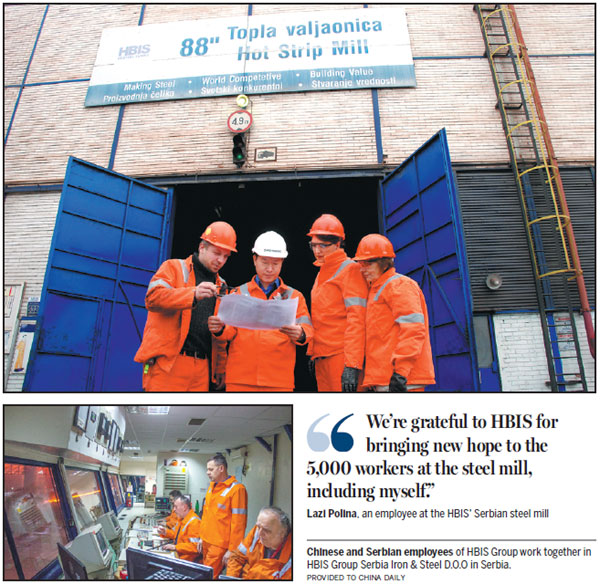Steel-maker turns around sick mill quickly with good management
After a year of imaginative management, HBIS Group of China has succeeded in turning around the troubled Smederevo steel mill, Serbia's largest, reinforcing the view that the conglomerate's go-global strategy is yielding positive results.
Hebei-based HBIS, one of China's largest iron and steel manufacturers, bought an ailing, loss-making Smederevo for 46 million euros ($51.5 million) in April last year and started to manage it in July.
The takeover ended seven years of losses and the 105-year-old Smederevo, which has since been renamed HBIS Group Serbia Iron & Steel D.O.O, was back in the black by the end of last year, said its CEO Song Sihai.
"It had taken only half-year for HBIS Serbia to turn a loss into a profit," said Yu Yong, chairman of HBIS Group.
HBIS Serbia's output in the second half of last year increased more than 50 percent from the first half, reaching the highest level since 2010.
Besides, in the same period, the output of high value-added cold-rolled sheets rose by 112 percent.
With its worldwide sales network, HBIS Group has opened up new markets like the US, Egypt, Turkey, Germany and Italy for its Serbian unit. In the second half of 2016, the mill was the second largest exporter in Serbia.
The dramatic turnaround was brought about by sustained efforts. Since the takeover, HBIS has sent nearly 200 Chinese personnel to deal with the problems of then Smederevo relating to mill management, finance, equipment, technology and craftsmanship.
"The biggest change for me is that I don't receive angry calls from suppliers any more," said Subotic arko, 41, director of the materials management department at the Serbian mill. He has been working at the mill for 13 years now.
He said it was hard for the mill to get all the materials needed because it had no stable finances, and didn't pay suppliers regularly before the takeover by HBIS.
Staff like him used to worry about their future. "Young colleagues delayed their plans for weddings and buying new houses, because they didn't know if their next salary was going to come and if they could repay bank loans," Zarko said.
After the takeover, however, things improved. "I didn't spend time on daily problems anymore, but focused on preparing ideas and projects for the future," he said.
According to Zarko, HBIS Serbia started to forge long-term contracts with suppliers in place of short-term and one-off ones. "That makes supply and price stable," he said.
Lazic Polina, who works at the mill's finance department, visited HBIS' subsidiary in Tangshan, Hebei, in June. She said she hoped one day the Serbian mill will thrive like HBIS.
"We're grateful to HBIS for bringing new hope to the 5,000 workers at the steel mill, including myself," she said, adding that HBIS's effective management has benefited common people like her.
Their salaries have increased by an average 10 percent from the pre-acquisition level, she said.
Yu said HBIS Group would make the Serbian steel mill competitive in both European and global markets.
HBIS will invest $120 million to strengthen the steel mill with new equipment and technology this year, according to Xinhua News Agency.
"Success in foreign investment means win-win for everyone concerned," Yu said.
HBIS Serbia said it respects local customs and cultural traditions, and does not lose sight of them while introducing advanced technological and managerial expertise in the company.
Among its employees, only 15 are Chinese, which reflects HBIS' policy of relying on local talents.
But the Serbian unit is a small part of HBIS' global operations. It has other subsidiaries in South Africa, Australia, Macedonia and the US.
According to the group, its overseas assets are worth $6 billion and the subsidiaries employ 12,000 workers in all. Last year, overseas markets contributed nearly one-third of HBIS' total sales.

